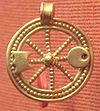Camulus
Camulus or Camulos was a theonym for a deity of the Celts that the Romans identified with Mars by interpretatio romana.[1] Camulus was an important god of early Great Britain and Gaul, especially among the Belgae and the Remi,[1] a Gaulish people living in the region that is now modern Grand Est around Reims.
Name[]
The etymology of the name is uncertain. It has been compared with the Old Irish cumall, meaning 'champion'.[2]
Attestations[]
Evidence of Camulus' popularity can be seen in several place-names, notably Camulodunum.[1]
Camulus is named in combination with Mars in inscriptions coming from Reims,[3] Arlon,[4] Kruishoutem,[5] Rindern,[6] Mainz,[7] Bar Hill Fort near the Antonine Wall,[8] Sarmizegetusa,[9] and Southwark, London.[10][11]
The town Camulodunum (now Colchester) in Essex may have been named after him (and is the conjectured basis for the legendary city of Camelot).[12] Camulodunum is a Latinised form of the Brittonic Camulodūnon from Camulos plus dūnon "(hill)fort, stronghold", a reference to the town's extensive Iron Age earthwork defences.[13]
Mythology[]
Very little is known about Camulus due to the Romans identifying him as Mars. What little is known is based depictions with little to no context.[4]
Camulus was known as the god of war. One of his biggest distinctions from Mars was being known as a god slow to anger.[1] He was seen as a guardian of his people with a defensive attitude vs the aggressive behavior of Mars. Camulus was often depicted wearing rams horns on his head, and carrying an unbreakable sword of iron.[12] Camulus was heavily linked to iron. He was thought to guide individuals to iron ore deposits so that his people could defend themselves from their enemies.[1] Beyond providing the iron ore, Camulus would scour the earth for the finest iron, from which he would create the strongest warriors to defend his territory from invaders, including rival settlements and hostile deities. Pieces of iron with magnetic properties were believed to be channeling the power of Camulus. Believing them to provide strength, magnetic iron was used to provide protection for the home, and for individuals when it was carried.[13]
Theories[]
Attempts from the 20th century and earlier to link the name Camulus with the nursery rhyme character Old King Cole, and with Irish mythological Cumhall, the hero Fionn's father, have been rejected by contemporary scholars.[1]
References[]
- ^ Jump up to: a b c d e f "Camulus". A Dictionary of Celtic Mythology. Oxford University Press. 2004 [1998].
- ^ Delamarre 2003, p. 101.
- ^ ILTG 351; AE 1935, 00064 [In] honor[em d(omus) d(ivinae)] / [3] Martis Cam[uli 3] / [Iucundiniu[s 3] / [Laurenti]um Lavinat[ium
- ^ Jump up to: a b CIL 13 3980 : Marti / Camulo / Lellius / Settus / v(otum) [s(olvit)] l(ibens) m(erito)
- ^ AE 1992, 01244 : Deo Marti Camulo / Verecundus Fructi / v(otum) s(olvit) l(ibens) m(erito)
- ^ CIL 13 8701 : Marti Camulo / sacrum pro / salute [Neronis] <<Tiberii>> / Claudi Caesaris / [A]ug(usti) Germanici Imp(eratoris) / [c]ives Remi qui / [t]emplum constitu/erunt
- ^ CIL 13 11818 : Marti / Camulo / sacrum / [ // Fronto / T[3]oni f(ilius) / d(onum) d(edit)
- ^ CIL 7 1103 : Deo Mar(ti) / Camulo / [m]ilites coh(ortis) [I] / Hamioru[m] / [2]CIV[1]SC[2] / [2]IVI[3]
- ^ AE 1998, 01100 : Invicto / Mithrae / Marti Camulo / Mercurio / Rosmertae / Q(uintus) Axius Aeli/anus v(ir) e(gregius) / proc(urator) Aug[g](ustorum) / Ioni(us)
- ^ "Moritix Londiniensium: A Recent Epigraphic Find in London" (PDF). The British Epigraphy Society Newsletter (8): 10–13. Autumn 2002. Retrieved 9 July 2018 – via University College London.
- ^ AE 2002, 882: Num(inibus) Augg(ustorum) / deo Marti Ca/mulo Tiberini/us Celerianus / c(ivis) Bell(ovacus) / moritix / Londiniensi/um / primus [3] / [3]VA[
- ^ Jump up to: a b Arthur Cotterell (1997). The Encyclopedia of Mythology: Classical, Celtic, Norse. Anness Publishing Ltd.
- ^ Jump up to: a b Crummy, Philip (1997). City of Victory: The story of Colchester - Britain's first Roman town. Colchester Archaeological Trust. ISBN 1 897719 04 3.
- Bibliography
- Delamarre, Xavier (2003). Dictionnaire de la langue gauloise: Une approche linguistique du vieux-celtique continental. Errance. ISBN 9782877723695.
- Gaulish gods
- War gods
- Roman Colchester
- Celtic mythology stubs

